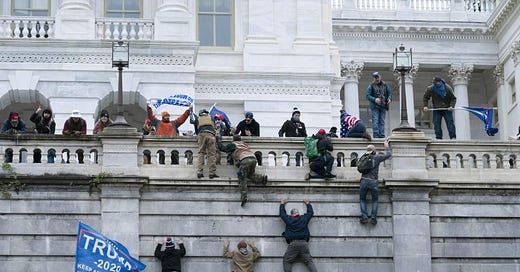Why SCOTUS Should Uphold the Jan. 6 Obstruction Charge
Sharing my New York Times article today
Last week, the Supreme Court heard arguments in Fischer v. United States, the case challenging an obstruction of justice statute used to prosecute hundreds of Capitol rioters (and Donald Trump). I’ve written previously on Sidebars about the case and why I believe the statute, 18 U.S.C. 1512(c), clearly applies to the events of January 6.
Today the New York Times published my essay arguing that the Supreme Court should uphold the use of the law. I wanted to share a free link to the article with all of you:
Why Is the Supreme Court Making an Easy Case Related to Jan. 6 Rioters Hard? - New York Times
One thing that strikes me that I didn’t have space to fully discuss in the article is the parallels between the arguments Fischer is making and the arguments Trump makes in support of his immunity claims.
Trump argues that a president has never been prosecuted before and that this indicates prosecuting a former president is unconstitutional. Similarly, Fischer and other January 6 rioters argue the Justice Department has never used 1512(c) in a case like this before and that this indicates the statute doesn’t apply.
As I note in the article, all this proves is that unprecedented crimes lead to unprecedented prosecutions. There’s never been an event like the Capitol riot, just as we’ve never had a former president who sought to overturn an election and remain in power. If the statute clearly applies, as I believe it does, the lack of historical precedent doesn’t really prove anything.
Trump also argues that if he is not granted immunity, prosecutions of former presidents will be come routine, as new administrations use the Justice Department to go after their predecessors. Implicit in that argument is a claim that future Attorneys General and Justice Department attorneys will abandon their ethics, discretion, and strict requirements about when criminal prosecution is appropriate and will simply use the justice system as a political weapon. That’s nonsense, of course: bringing a justified prosecution does not signal that future prosecutors will routinely bring unjustified ones.
The same is true with 1512(c). The “parade of horribles” argument Fischer makes is that if the government’s interpretation of the statute is upheld, future prosecutors will use the statute to pursue trivial or even constitutionally-protected conduct like peaceful protests or political lobbying. But again, bringing a righteous prosecution in a case where the statute plainly applies (and which plainly does not involve peaceful or protected conduct) does not mean future prosecutors will suddenly abandon the discretion and judgment they’ve used for decades when deciding what cases justify an obstruction of justice charge.
We should have the Court’s decision by the end of June.





As usual, an excellent analysis that is easy to follow and understand.